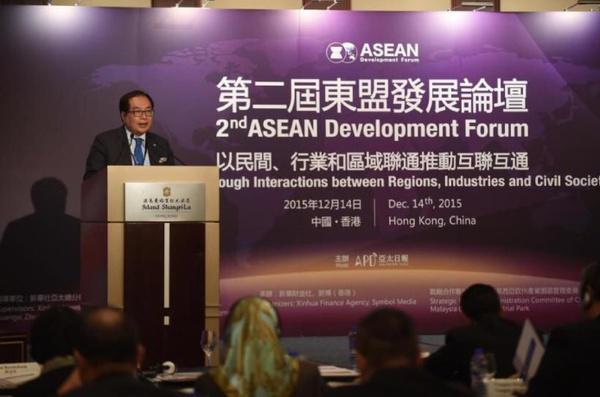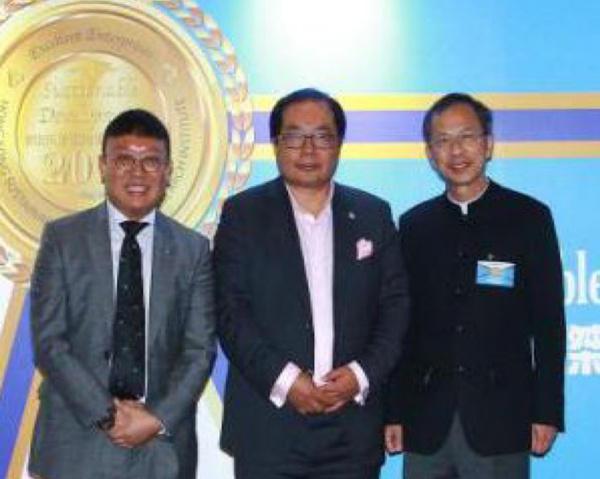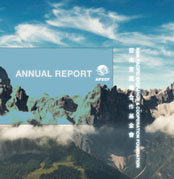December 26th, 2015
Xiao Wunan: Promising prospect for China-ASEAN cooperation under TPP framework
(From ifeng.com) The second ASEAN Development Forum sponsored by the Xinhua News Agency, Asia Pacific Exchange and Cooperation Foundation was held recently in Hong Kong. The theme for this year's ASEAN Development Forum is "Interaction between regions, industries and civil society."

HKSAR Chief Executive Leung Chun-ying, Chinese Ambassador to ASEAN Xu Bu, Former Deputy Prime Minister of Thailand, Chairman of Sino-Thai Culture Association Pini, Indonesian Tourism Minister Yahya, Director of HKSAR Financial Services and the Treasury Bureau KC Chan,Executive Vice Chairman of APECF Xiao Wunan, Standing committee member of Shenzhen government, director of Qianhai and Shekou FTZ Tian Fu have delivered speeches.
ASEAN Consuls based in Hong Kong, the ASEAN Secretariat officials, ASEAN government officials, experts and scholars, and more than 200 distinguished guests from Hong Kong business and professional organizations, attended the forum to exchange ideas and discuss issues.
Executive Vice Chairman of APECF Xiao Wunan delivered a keynote speech at the Forum: "Cooperation prospect between China and ASEAN under TPP framework," which has been warmly received by the attending guests. According to Mr. Xiao Wunan, China-ASEAN cooperation is facing huge challenges posed by TPP, and he offered several thoughts on how to evaluate this challenge:
First, TPP has brought huge challenges to China-ASEAN cooperation, one is the exclusion of China, posing threat to China-ASEAN cooperation mechanism in terms of strategic framework; on the other hand, ASEAN countries participating in TPP will have to tread a fine line in bilateral trade relationship with China. These are very complex issues for all parties and will bring unknown variables to bilateral and multilateral relations between China and ASEAN.
Moreover, TPP will pose challenges to the existing WTO and APEC framework, undermining the mature international rules and dispute settlement mechanisms. Due to the impact of TPP, all of these mechanisms will be reshuffled.
At the same time, non-economic rules will pose challenges to economic rules. Although there are interference into legal system and administrative management, generally speaking, FTA, WTO and other trade mechanisms still prioritize economic factors. TPP has gone beyond the scope of investment and trade. In terms of its content, it has extended into legal, intellectual property, labor policy and so on, with requirement on the political system. Therefore, TPP is not limited to economic partnership. It aims at changing the internal rules of a country and international relationship, thus creating a new international political and economic order.
Despite these challenges, there are also opportunities on three levels:
First, China's economic reform has entered the deep water zone. What does "deep water" mean? It means profound reform on institutes, legal system and vested interest. TPP will help China take "forced reform". China has established "Shanghai FTZ", "Tianjin FTZ," and "Qianhai Shekou FTZ", the aim of which is to explore the direction of China's future reform from institutional and legal points of view. To some extent, TPP conforms to China's reform objectives.
Furthermore, in Nov. 2014, General Secretary Xi Jinping proposed to build diplomacy with Chinese characteristics at the Central Foreign Affairs Work Conference. United States based its diplomacy on security while China is prioritizing economic development. "Asian Infrastructure Investment Bank" and the "One Belt One Road" strategy driven by China are to build international relations and promote new world order through the means of development, which is different from the United States. China wants to share its own experience with ASEAN countries to solve development issues and improve people's lives. Disparity among ASEAN countries in economic and social development requires improvement of infrastructure and poverty alleviation. The United Nations “Millennium Development Goals” or "Development Goals for the next Millennium" regarded poverty alleviation as an important task. The path advocated by China aligns with the United Nations code of conduct and benefits the peoples of ASEAN. Hence, it should be left for history to judge which model should prevail. Perhaps because of the expansion of the TPP, China has accelerated investment in ASEAN infrastructure to promote economic development and people's living standard.
As far as TPP is concerned, its core is to address the impact of "the visible hand" of government on social equity and justice. Its purpose is to achieve the theme of the ASEAN forum: "Interaction between regions, industries and civil society". The ultimate goal of TPP, FTA,WTO,or APEC is to achieve interaction. Desirable result comes first no matter what means it may take. China and ASEAN have natural advantage for cooperation in terms of history, culture and development which triumph over potential political, military and economic conflicts. The next decade will present golden opportunities for both China and ASEAN to make breakthroughs in their relationship. Therefore, the prospect for China-ASEAN cooperation is promising. Eventually the region will see even greater prosperity and better living standard for its people.

During the meeting, the President of the Legislative Council of Hong Kong Tsang Yok-sing and Mr. Xiao Wunan meet and reach significant consensuses on a number of issues between the Mainland and Hong Kong.


 Back
Back